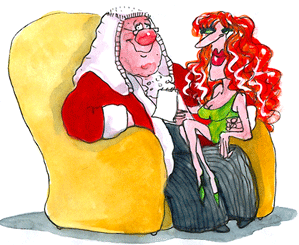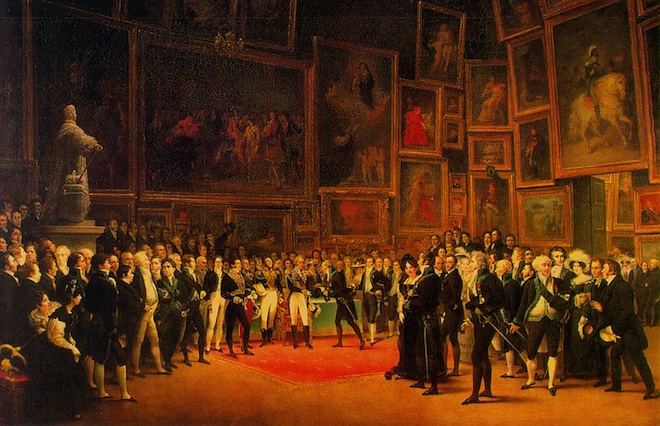Selection of new silks ... An odd arrangement that rewards and divides the bar ... The relative importance of popularity and outstanding achievement ... A fresh round of humiliation ... Ginger Snatch reflects
 Clap-clap and bravo for the new silkies.
Clap-clap and bravo for the new silkies.
The fresh crop in NSW will be kitting themselves out, changing their letterhead and practising their bows.
It's been a long, hard slog, but the pop of corks in chambers made it all worthwhile.
The 24 new SCs are officially ordained as those who can provide "outstanding services".
The implication is that everyone else at the bar doesn't provide outstanding services, which is a novel way of marketing a professional body.
It's also a tad insulting.
Those who applied and failed must feel particularly miserable.
The silk selection issue was raised last Thursday night (Oct. 10) at the meeting of the bar council.
How the choices were made once again has been thrown into contention.
Previous fiddling at the edges with the protocol has only resulted in cosmetic changes.
None of which is to say that the selectors don't take the task seriously.
However, the strong feedback is that popularity is just as important a driver for attainment of the silk robe as achievement and excellence.
The number of ticks can trump the number of successful cases in the higher courts.
 One applicant who successfully led an important constitutional case in the High Court, against the State and Commonwealth solicitors generals, was turned down, again.
One applicant who successfully led an important constitutional case in the High Court, against the State and Commonwealth solicitors generals, was turned down, again.
Gabriel Wendler, with 25 years at the bar and a solid criminal and appellate practice, did the X7 case from the ground up, with the High Court confirming a fundamental principle of criminal justice - striking down the power of the Crime Commission to require an accused charged with an indictable Commonwealth offence to answer questions before trial.
He has also led or been junior in a number of High Court and Court of Criminal Appeal cases and carried the endorsement of Sandy Street, Robbie Richter, senior criminal solicitor Bill O'Brien and former justice Greg James.
Further details can be seen on his application here.
Wendler is on the bar's criminal law committee and the NSW Legal Aid complex criminal trial and appellate panels.
He is not an isolated instance, yet for the majority of successful silk applicants their first visit to the High Court would be the bowing ceremony in February.
That aside, most have not lead a case in the Court of Appeal.
How is this sort of anomaly explained when outstanding achievement is the core ingredient for senior counsel.
Clearly, some unspoken, unspecified quality is also at play. Maybe, it's a case of being talented as well as having that elusive something else - "acceptability".
Unfortunately, the silk selection protocol fails to mention anything about "acceptability".
Then there are instances where applicants were told a year ago that it was "too early" to take silk.
They were advised during follow-up discussions with the powers-that-be to apply next year and, nod-wink, everything will be rosy.
Imagine the dismay when they were handed another rejection slip on October 4.
* * *
 Selection and rejection at the Salon
Selection and rejection at the Salon
From off-the-record discussions we have had it seems that in many instances referees are not followed-up for further comment or background. This suggests that of the one hundred or so who apply the first round filtering process is ruthless.
If a candidate has been rejected in previous years the chances are that the filter will keep removing them from contention, year in year out, even if they have under their belts considerable achievements.
If the selectors want you through to the next round only then might referees be called upon.
It's interesting that this year no one from the private criminal defence bar was appointed SC.
Conspiracy theories abound.
For instance, traditionally a few big-wigs from Forbes Chambers have played important roles in the selection process.
The conspiratorial question posed is, would it be in the interests of selectors, or advisors to selectors, to protect their own patch by opposing the appointment of new criminal silks in other chambers?
How are personal enmities, jealousies and preconceptions about competitors avoided?
There's also an important economic consideration - more and more criminal work is being eaten by solicitor advocates. There a less to go around, so this could be a factor in concentrating the work in the hands of existing silks.
And what about snappy and resentful judges who just tick "NO" because counsel have had the temerity to challenge them?
How idle is this speculation?
* * *
A striking feature of recent years is the dominance of the white bread Anglo-Celt clan attaining entry to the Senior Counsels Club.
Attention has been focussed on the under representation of women at the top of the game, but where are the silks of "Middle Eastern appearance", the Chinese, Indians, people from South East Asia, Latinos, Turks, Mediterraneans, etc?
Go and wander around Parramatta, the geographic centre of Sydney, and get a glimpse of what an incredibly diverse country we are.
The bar and the judiciary are in a different universe. Comparatively few have come from culturally different ethnic communities to make it to the top of the greasy pole.
Of course, progress through the ranks of the law is all about being "outstanding".